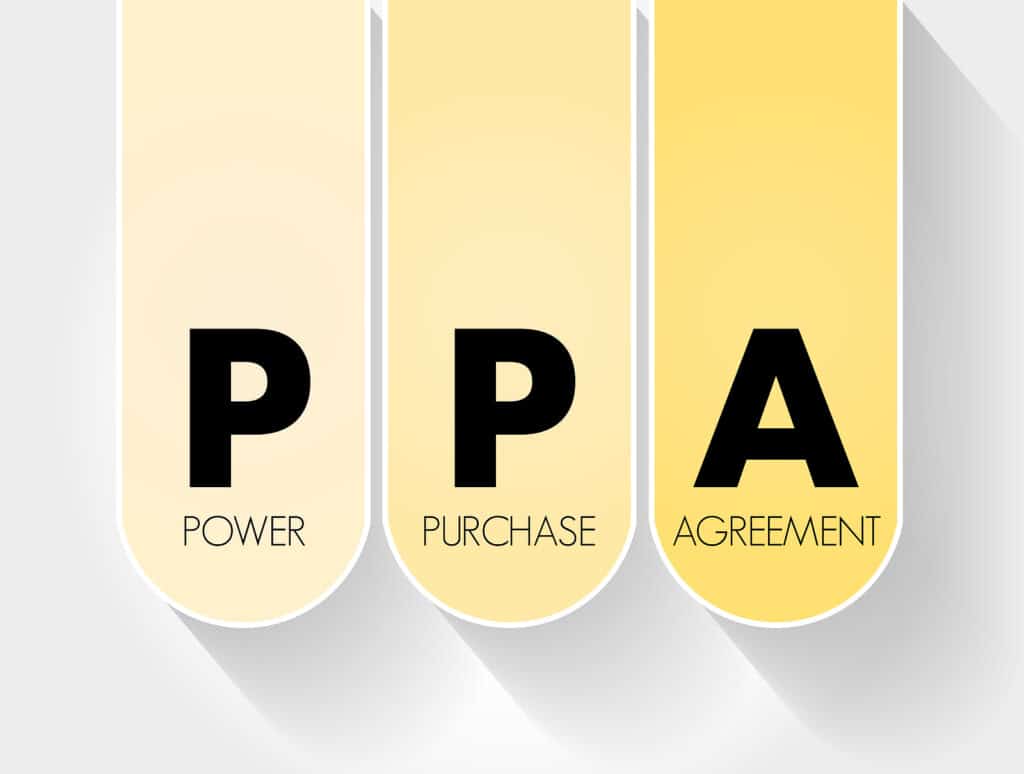Power Purchasing Agreements
As the world shifts towards renewable energy, more and more businesses are turning to power purchasing agreements (PPAs) to procure clean energy. PPAs allow businesses to purchase electricity from renewable sources, such as solar or wind, at a fixed price for a specific period of time. These agreements offer several benefits for companies, including cost savings, energy security, and environmental sustainability.
In this comprehensive guide, we will explore the basics of power purchasing agreements, how they work, and their advantages for businesses. We will also discuss the different types of PPAs and the key considerations for businesses when entering into a PPA.
Power Purchase Agreements What is it?
A Power Purchasing Agreement is a contract between two parties, usually a renewable energy project developer and an electricity consumer, in which the developer agrees to sell electricity to the consumer at a fixed price for a specific period of time. PPAs are typically used for renewable energy projects, such as solar or wind, which can generate electricity at a lower cost than traditional fossil fuels.
PPAs are often structured as “virtual” contracts, meaning that the electricity generated by the renewable energy project is not physically delivered to the consumer. Instead, the electricity is sold into the grid, and the consumer receives credit for the energy produced. This allows the consumer to offset their energy consumption with renewable energy without having to physically connect to the project.

Types of Power Purchase Agreements
Power Purchasing Agreements (PPAs) come in various types, each offering distinct benefits and risks for businesses seeking to invest in renewable energy projects.
Physical PPAs
Physical PPAs involve contracts where the renewable energy generated is physically delivered to the consumer. To establish this connection, the consumer must have a direct link to the renewable energy project or access to the electricity grid. The significant advantage of physical PPAs lies in providing businesses with a high level of energy security. Since the electricity is directly delivered, it ensures a steady and fixed supply of power, which can be crucial for industries with consistent power demand.
Financial PPAs (Contract for Differences – CFDs)
Financial PPAs, also known as CFDs, operate differently from physical is a PPAs. In this arrangement, the developer agrees to sell electricity to the consumer at a fixed price, but the actual physical delivery of electricity does not occur. Instead, the developer compensates the consumer for any difference between the fixed price agreed upon in the PPA and the prevailing market price of electricity. The key benefit of financial PPAs is that they allow businesses to secure a fixed pricing structure for their electricity needs without requiring a direct connection to the renewable energy project. This can be advantageous in situations where it is challenging to establish a physical link.
Synthetic PPAs
Synthetic PPAs are another category of agreements wherein the developer commits to selling Renewable Energy Certificates (RECs) to the consumer at a fixed price. RECs represent the environmental attributes of renewable energy generation. By purchasing RECs, businesses can claim the environmental benefits of renewable energy without physically consuming the electricity. Synthetic PPAs offer the advantage of promoting environmental sustainability without the necessity of establishing a direct connection to the renewable energy project or the electricity grid.
Advantages of Power Purchasing Agreements for Businesses
sample power purchase agreements (PPAs) present numerous benefits for businesses, encompassing cost savings, energy security, environmental sustainability, and enhanced flexibility in energy management.
Cost saving
PPAs enable businesses to procure electricity at a fixed price over a specified period, offering stability and shielding them from the fluctuations in energy markets. Since renewable energy sources often boast lower costs compared to traditional fossil fuels, businesses can capitalize on long-term cost savings throughout the PPA's duration.
Energy security
For businesses heavily reliant on electricity to sustain their operations, such as data centers and manufacturing facilities, PPAs offer a reliable and consistent supply of electricity. By locking in a fixed supply through a PPA, businesses can mitigate the risks associated with sudden energy price spikes or supply disruptions, ensuring uninterrupted operations.
Environmental sustainability
PPAs empower businesses to actively participate in reducing their carbon footprint and supporting the global transition to renewable energy. By purchasing electricity generated from renewable sources, businesses significantly curtail their greenhouse gas emissions, contributing to a cleaner environment. Additionally, investing in renewable energy projects through PPAs fosters sustainable development and creates employment opportunities within local communities.
Economic Benefits
Beyond environmental considerations, PPAs yield tangible economic advantages for businesses. By securing predictable energy costs through fixed-price agreements, companies can enhance their competitiveness and financial stability. The reduction in long-term energy expenses provides a positive impact on their bottom line, freeing up resources for other strategic investments and growth initiatives.
Flexibility and Customization
PPAs offer a high degree of flexibility, allowing businesses to tailor agreements to match their specific energy requirements. Companies can opt for the agreement's length, mix and match various renewable energy sources, and customize the terms to align with their operational needs and sustainability goals. This adaptability ensures that businesses can implement energy strategies that best suit their unique circumstances.
No Infrastructure Investment Required
One of the most significant advantages of PPAs is that businesses can embrace renewable energy without the need for upfront investments in renewable energy technologies or infrastructure. Instead, they can tap into the clean energy produced by established renewable energy projects through the PPA, which promotes wider adoption of sustainable energy practices.

Considerations for Businesses Entering into a Power Purchasing Agreement
Entering into a Power Purchasing Agreement (PPA) can yield significant advantages for businesses, but to ensure a successful and mutually beneficial arrangement, several crucial considerations need to be taken into account:
Project Location
The location of the renewable energy project holds paramount importance for businesses. Proximity to the business facilities can reduce transmission costs and enhance energy security. Additionally, assessing the regulatory environment in the project location is vital to ensure that the PPA adheres to local laws and regulations, making it legally enforceable.
Contract Terms
Thoroughly understanding the terms of the PPA is essential for businesses to derive the intended benefits. Careful scrutiny of the contract ensures that businesses receive fixed pricing, reliable energy supply, and the environmental advantages they seek. Key elements to examine include contract duration, provisions for early termination or renewal, and any performance guarantees offered by the developer.
Creditworthiness of the Developer
The financial stability and creditworthiness of the developer significantly impact the success of the PPA. A thorough due diligence process on the developer's financial standing is crucial to assess their ability to secure project financing and fulfill their obligations under the PPA. Businesses should ascertain the developer's track record in delivering successful projects and their overall reputation in the industry.
Regulatory Environment
The regulatory landscape can heavily influence the feasibility and attractiveness of PPAs for businesses. It is essential to consider the regulatory framework in the business's operating location, including any incentives, subsidies, or tax benefits offered for renewable energy projects. On the other hand, potential barriers or restrictions on renewable energy development must also be evaluated to avoid any unforeseen challenges in executing the PPA.
Project Viability and Risk Assessment
A comprehensive risk assessment is crucial before committing to a PPA. Businesses should evaluate the technical viability of the renewable energy project, ensuring it meets their energy demands and can reliably supply the required electricity. Identifying potential risks such as project delays, equipment performance, and grid connectivity issues helps in developing contingency plans to mitigate possible disruptions.
Legal and Financial Expertise
Negotiating and finalizing a PPA can be complex and involves legal and financial intricacies. Businesses should engage legal counsel and financial experts experienced in renewable energy PPAs to ensure favorable terms and compliance with all legal requirements. These experts can help businesses navigate complex clauses, understand the financial implications, and safeguard their interests in the agreement.
Market Dynamic
Businesses should also consider the prevailing energy market dynamics, as they may influence the long-term cost competitiveness of the PPA. Analyzing historical and future energy market trends can help businesses make informed decisions and secure more advantageous pricing in their PPA.
Benefits for Different Types of Businesses
Power Purchasing Agreements (PPAs) provide a diverse array of benefits tailored to suit the unique energy requirements and sustainability goals of different businesses across various sectors. Here's a more detailed overview of the benefits that PPAs offer to specific industries:
Technology Sector
For technology companies that rely heavily on continuous and reliable electricity supply to power data centers, server farms, and high-performance computing, PPAs offer unmatched advantages. The stability and predictability of fixed-price electricity procurement through PPAs ensure cost savings and long-term budget certainty, allowing technology businesses to focus on innovation and expansion. Additionally, embracing renewable energy through PPAs aligns with the technology sector's increasing focus on sustainability and corporate social responsibility, bolstering their reputation as environmentally conscious entities.
Manufacturing Sector
Manufacturing businesses, with their significant energy demands for production lines, machinery, and facilities, can greatly benefit from PPAs. The reliability of energy supply provided by PPAs ensures uninterrupted operations and minimizes the risk of production disruptions caused by energy price fluctuations. PPAs also enable manufacturers to control and forecast their energy expenses, improving financial planning and facilitating better investment decisions. Embracing renewable energy through PPAs aligns with the sustainability goals of many manufacturing companies and allows them to play a key role in reducing the carbon footprint of industrial operations.
Retail Sector
In the retail sector, where energy consumption is vital for lighting, heating, cooling, and refrigeration in stores and warehouses, PPAs offer significant cost savings and enhanced energy security. Fixed-price electricity from renewable sources ensures stability in operational expenses, which is especially beneficial for multi-location retailers seeking to streamline their energy budgeting across their various outlets. Retailers also demonstrate environmental stewardship by opting for renewable energy through PPAs, which resonates with eco-conscious consumers and strengthens brand reputation.
Commercial Real Estate Sector
The commercial real estate sector can capitalize on PPAs to achieve energy cost reduction and enhance the appeal of their properties to tenants and investors. By procuring renewable energy through PPAs, commercial property owners and developers can offer environmentally friendly, sustainable spaces that align with the preferences of modern businesses and individuals. PPAs also create an opportunity for commercial real estate firms to differentiate themselves in the market and contribute to community sustainability efforts.
Hospitality and Tourism Sector
The hospitality industry, including hotels, resorts, and entertainment venues, can benefit from PPAs by minimizing operational costs associated with electricity consumption. Fixed-price energy from renewable sources ensures stable utility expenses, allowing hospitality businesses to allocate resources more efficiently and potentially enhance guest experiences. Moreover, adopting renewable energy through PPAs aligns with the growing trend of eco-tourism, attracting environmentally conscious travelers seeking sustainable destinations.
Sources of Power Purchasing Agreements
There are several sources of PPAs for businesses, including utility-scale projects, on-site generation, and community solar.
Utility-scale projects are large-scale renewable energy projects, typically located in remote areas. These projects can provide a reliable source of electricity for businesses, but may require transmission infrastructure and may not be located near the business.
On-site generation involves installing renewable energy generation on the business's own property. This can provide cost savings and energy security, but may require upfront capital investment and may not be feasible for all businesses.
Community solar involves purchasing a share of a larger-scale solar project, typically located in a nearby community. This can provide cost savings and environmental benefits for businesses, while also supporting the development of renewable energy in the community.
Conclusion
Power Purchasing Agreements offer several benefits for businesses, including cost savings, energy security, and environmental sustainability. By entering into a PPA, businesses can secure a fixed supply of renewable energy at a fixed price, which can help to reduce energy costs and mitigate the risk of energy price volatility and supply disruptions.
Businesses should carefully consider the project location, contract terms, creditworthiness of the developer, and regulatory environment when entering into a PPA. PPAs are available from a variety of sources, including utility-scale projects, on-site generation, and community solar power purchase agreement. As businesses continue to prioritize sustainability and reduce their carbon footprint, Power Purchasing Agreements are likely to become an increasingly important part of their energy procurement strategy.
Overall, PPAs offer a win-win solution for both businesses and renewable energy project developers. By purchasing renewable energy, businesses can reduce their carbon footprint and support the transition to a low-carbon economy. At the same time, renewable energy project developers can secure long-term contracts and financing for their projects, which can help to accelerate the transition to renewable energy.
As the demand for renewable energy continues to grow, businesses of all sizes are likely to consider PPAs as a viable option for their energy procurement needs. With careful consideration of the project location, contract terms, creditworthiness of the developer, and regulatory environment, businesses can take advantage of the many benefits that PPAs have to offer.
Sources:
- Greenbiz. (2021, February 10). A beginner's guide to renewable energy procurement. https://www.greenbiz.com/article/beginners-guide-renewable-energy-procurement
- National Renewable Energy Laboratory. (2021). Power Purchase Agreements. https://www.nrel.gov/state-local-tribal/blog/posts/power-purchase-agreements.html
- World Wildlife Fund. (2019). A Guide to Corporate Renewable Energy Procurement. https://www.worldwildlife.org/publications/a-guide-to-corporate-renewable-energy-procurement

